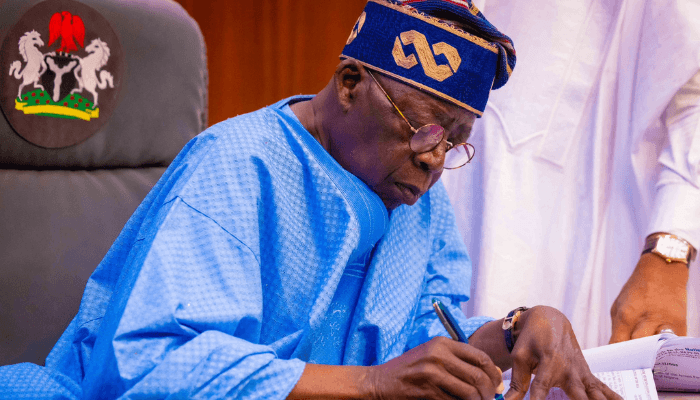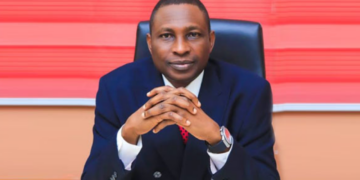In a recent move that eerily echoes past decisions, President Bola Tinubu sought approval from the National Assembly for an $800 million loan and an additional N500 billion palliative for the removal of petrol subsidy.
We recall that in his inauguration speech, President Tinubu announced the removal of fuel subsidy. However, this decision has resulted in an unprecedented surge in the prices of goods and services across the country.
Undoubtedly, the sharp increase in commodity prices is having a detrimental impact on individuals who are already grappling with financial hardships and trying to make ends meet.
It is important to note that we had previously on this page expressed support for the removal of fuel subsidy, as we believed that maintaining it was no longer a sustainable option.
However, in the considered opinion of this newspaper, while it is essential to address the economic challenges facing our nation, it is disheartening to witness the repetition of failed strategies that have not worked in the past.
Going by reports, the federal government plans to pay N8000 to 12 million Nigerians for six months to cushion the effect of the removal of fuel subsidy .
Indeed, as concerned citizens, we must express our disappointment and concern over the government’s lack of innovative thinking and advocate for a more prudent allocation of resources that will yield long-term benefits for our nation.
We also recall that during the administration of President Muhammadu Buhari, a similar approach was employed, and it failed to deliver the intended results. The National Social Investment programme , school feeding programme ,Trader moni and other schemes failed to achieve the desired effect. It was a temporary solution and ended up as a massive drain on the nation’s resources without providing lasting relief for the people.
Sadly, in our view, the proposed plan of distributing cash directly to families for a limited period seems to be treading the same path, with minimal prospects of achieving the desired impact.
Nigeria’s history is replete with instances where cash handouts have not led to sustainable development or progress.
Instead of providing much-needed relief, it perpetuates dependency and fosters an attitude of entitlement among the citizens. Such short-term solutions, we dare to point out, may provide temporary respite, but they fall woefully short of addressing the root causes of the nation’s economic challenges.
The successful implementation of an increase in fuel prices was only achieved during the administration of the late Sani Abacha. His government established the Petroleum Trust Fund (PTF), which effectively utilized the additional revenue from the fuel price hike.
Under the PTF’s management, numerous roads were constructed, and several hospitals were equipped with modern facilities and resources all across the country.
It is worth acknowledging that, despite the contentious nature of fuel price increases, the strategic utilization of these funds through the PTF had a positive and tangible impact on the nation’s infrastructure and healthcare system.
As a nation, we must break away from this cycle of inefficient palliatives and invest in strategic initiatives that will spur economic growth and improve the well-being of the people.
Allocating the proposed funds towards more constructive endeavors such as purchasing buses, equipping primary healthcare centers, and investing in the power sector can create a lasting impact on the lives of Nigerians and the overall development of our country.
Transportation remains a significant challenge for many Nigerians, particularly in urban centers. By investing in a modern and efficient bus transportation system, we can enhance mobility, reduce traffic congestion, and bolster economic activities.
Furthermore, directing funds towards improving primary healthcare centers is a crucial step in ensuring that quality healthcare is accessible to all citizens. By providing adequate resources and training for healthcare professionals, we can enhance disease prevention, early detection, and treatment, ultimately leading to a healthier and more productive population.
The power sector is another area that demands immediate attention. Investing in power generation and distribution will not only attract foreign investment and drive industrial growth but also improve the quality of life for millions of Nigerians who currently lack reliable access to electricity.
A robust power sector is the backbone of any thriving economy, and it will undoubtedly propel the nation towards sustained progress.
In advocating for these alternatives, we acknowledge that they require careful planning, transparent implementation, and consistent monitoring to ensure they yield the desired outcomes. But we firmly believe that they represent a more effective and forward-looking approach compared to simplistic cash handouts that lack long-term vision.
To become a world-class nation, we must demonstrate a commitment to break free from the chains of old, unproductive practices. As we express our reservation about the repetition of past mistakes, we must call upon President Tinubu to embrace progressive strategies that focus on sustainable development and inclusive growth.
Consequently, Nigeria deserves better than a rerun of ineffective and wasteful palliatives that have failed us in the past. President Tinubu and the National Assembly have an opportunity to break away from the cycle of short-sightedness and pave the way for a brighter future for the nation. Let us use the proposed funds wisely, investing in critical sectors like transportation, healthcare, and power generation to create a legacy of progress and prosperity for generations to come.
It is time to bid farewell to failed palliatives and embrace a new era of genuine economic growth and development.





